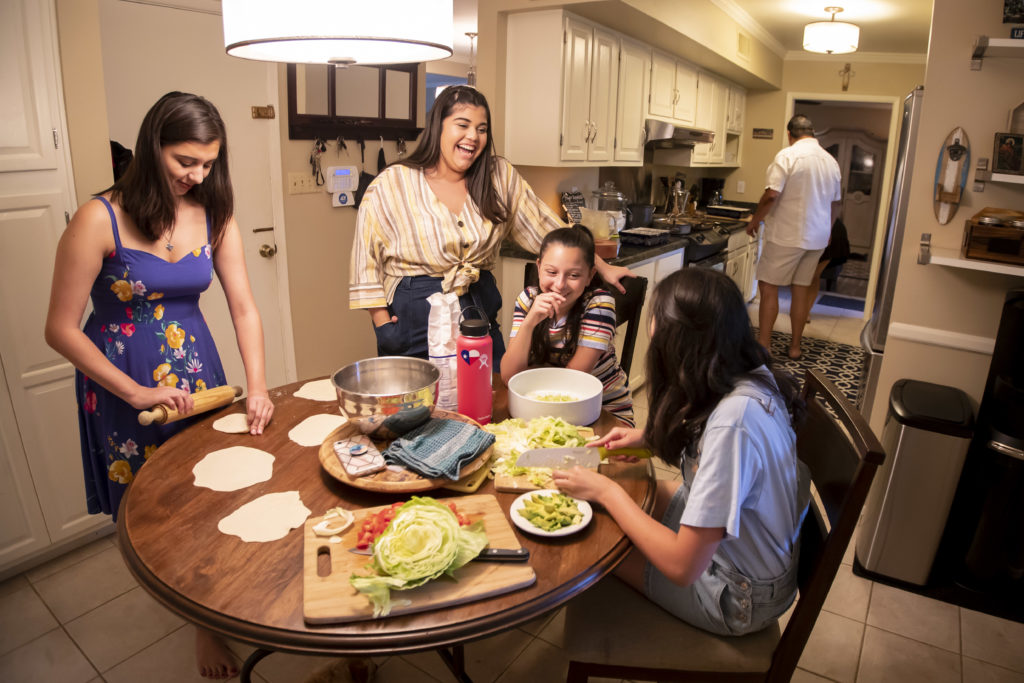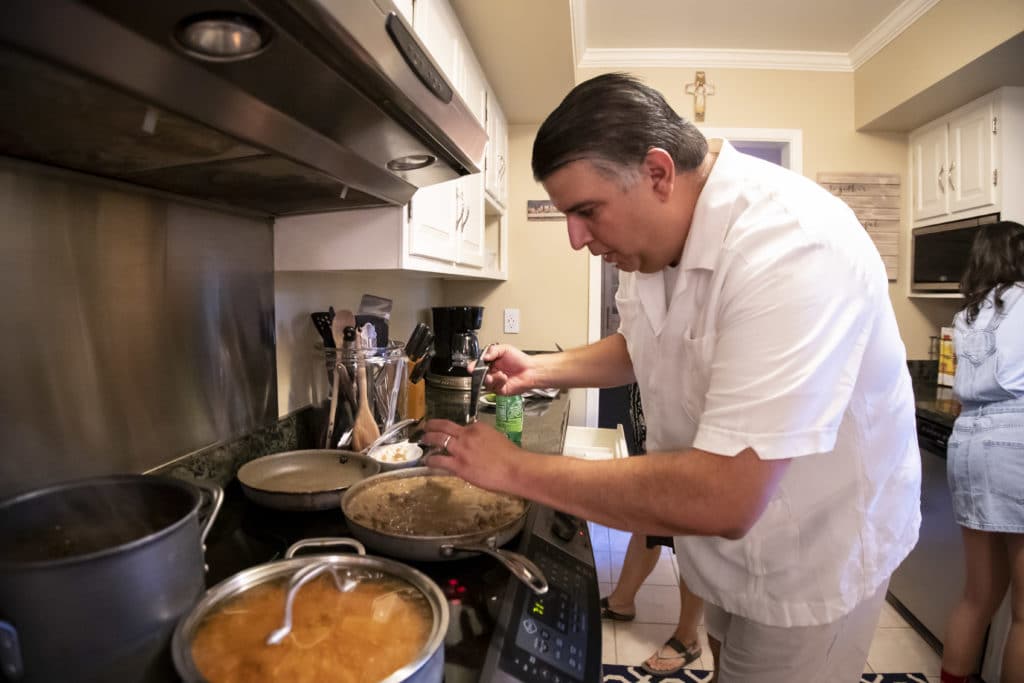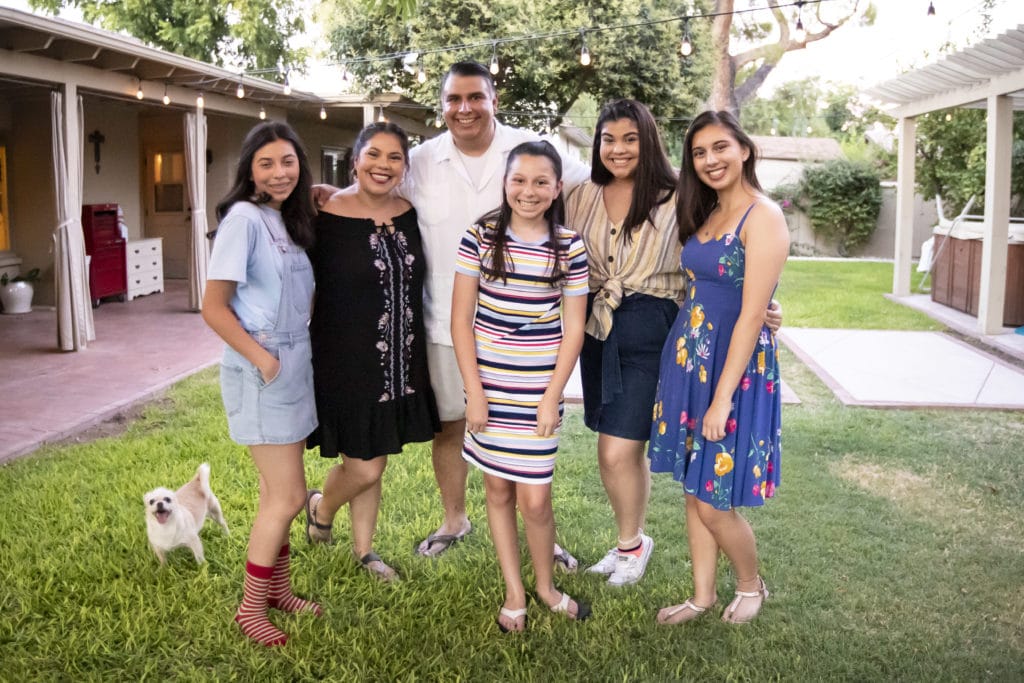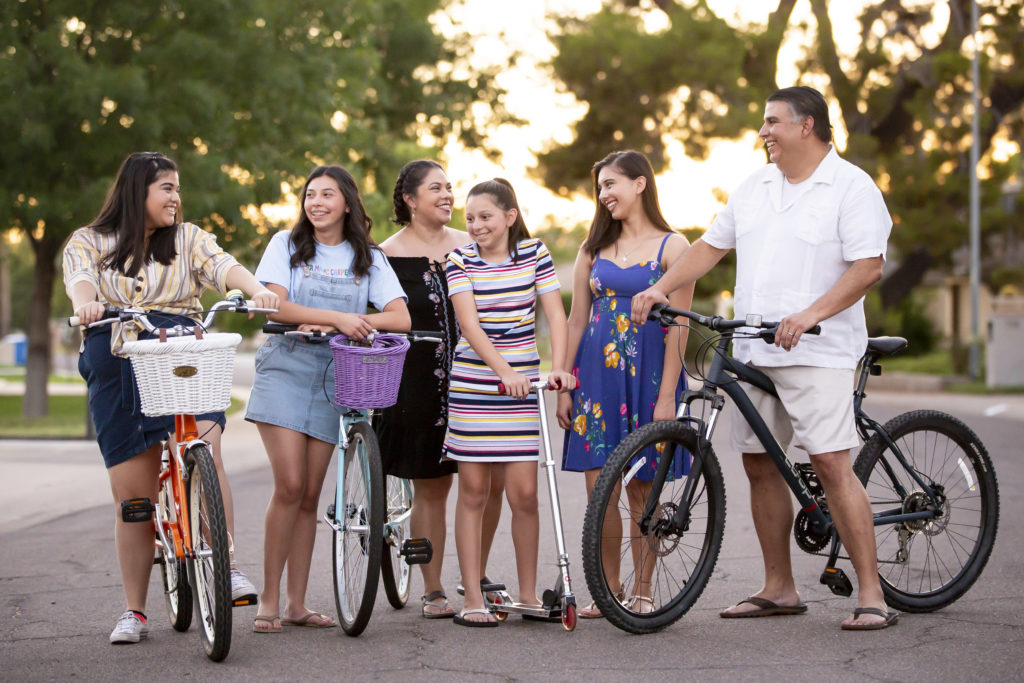Cande and Rosemary de Leon live in Phoenix, where Cande serves as the executive director for mission advancement for the Diocese of Phoenix while Rosemary serves as the catechist for The Catechesis of the Good Shepard program at St. Francis Xavier Catholic School. Originally form Corpus Christi, Texas, the couple met while Cande was serving in the United States Marine Corps. He boldly proposed to Rosemary after knowing her for only two weeks!
Rosemary was Baptist, and Cande was very distant from the Catholic faith. They decided to learn about each other’s faith, which led to Rosemary becoming Catholic after finding a connection with the Blessed Mother as a pregnant mom. Twenty-two years later, they have four daughters — Isabella (21), Abigail (18), Alexandra (14) and Sophia (11) — and are focused on strengthening their family to serve others.
Here’s a bit about how they live their faith at home and in their communities.
How do you prevent your prayer life from growing stale and just going through the motions?
Cande: I really struggle with memorized prayers. When I first entered a personal relationship with Jesus, I spent hours thinking about how I prayed. Specifically, I thought about how I was taught as a child. For years I prayed out of memorization and habit; I never gave much thought to what I was saying. This really disappointed me as I thought about how I never really gave much effort to my prayer life, other than just reciting a quick “Hail Mary.”
As I have learned, I’ve realized the two best ways for me to pray are while I drive and when I’m with others. If others ask for prayer, I pray for them immediately, in the moment. At times, I will ask someone if I can pray for them. Then, I will also do that immediately so I won’t forget; I will just say what is in my heart. Sometimes I pray aloud spontaneously. At times it’s a rosary; other times I just talk to God and visualize that he is right next to me. The other thing I do regularly is drive with the radio off, in silence. This is my time with God, my time to think and listen for his voice. I’ve learned that my prayer life is my relationship with God.
I want to grow in my ability to defend the Catholic faith and teachings. What are the best resources or ways to educate myself?
Cande: For those who want to learn more about their faith and have the ability to defend it, they have to dive deep into the word of God. The Bible is a great gift that I only began to utilize later in my life. Reading the Bible isn’t like reading a book; it’s more like a glimpse into humanity’s connectedness. At times I have found it a bit difficult to understand and see the big picture or even the details of our history. When I have felt this way, I’ve paused to pray and ask the Holy Spirit for wisdom, and I have always tried to seek out experts in Scripture.
When I first started my journey as an adult in the faith, I listened to people who shared the word of God on the radio. I recall listening to a Protestant pastor who was syndicated, named Alistair Begg, from the Truth for Life ministry. He is one of the best exegetical presenters I have ever heard to this day, and I have often thought about reaching out to him to thank him for his ministry. I think back on how that was just the beginning of my journey, and although he is not Catholic, he helped me understand Scripture. It was up to me to use this as a starting point and put it through the lens of the church. This compelled me to learn more. Another great teacher for me was Archbishop Fulton Sheen. His simple and direct style of sharing the Gospel was exactly how I needed God’s word to be introduced in my life.
This is the way I learned, but for others it may be something different. There are too many good Catholic authors to count, but what I would encourage everyone to do is to challenge what they read — even if it’s from the most respected authority in the church. This forces the reader to understand what they are reading. I think a good example of this is how St. Thomas Aquinas writes in the Summa Theologica.


How can I best live out our call to be missionary disciples in my local community?
Rosemary: Start at home. I think our call as missionary disciples begins in our own families, before we even attempt to go anywhere else. How do we love those closest to us, when those closest to us also drive us crazy? Our family is notorious for teasing, joking, and they are especially sarcastic. Our family has also seen our brokenness, weaknesses and faults, but in all this, the love we have for each other is central. They have always been very good at holding Cande and me accountable to stay true to ourselves, and we have done the same for them. A very dear priest friend of ours always said, “Who you are at home is who you truly are.” I have always loved this, because although I serve our community as a missionary disciple, first and foremost for me is how I love my family.
What are some of the most effective ways you have found for growing in faith as a family … through the sacraments, prayer, etc.?
Cande: In order to help our daughters grow in their faith, my wife and I have tried to build trust and consistency with them. We believe the family is a reflection of the church, so we have tried to teach them the church is their family; therefore, our love for them should serve as that example.
Rosemary: To provide this example, we do things such as working together, eating together and spending quality time with each other. Usually on Saturday morning you can find our family either cleaning our home (always with very loud music playing) or outside working on our yard. Whatever it is we are doing, we are always doing it as a team. By working together, we build accountability to the family, and we are teaching service to one another. We tell our daughters it is their contribution to the family. If you ask our daughters about a family motto, they would be quick to respond our motto is: “It’s not about me.” We believe by teaching our daughters service and sacrifice and showing love in the family, it will be easier for them to do the same for others.
Cande: As our family has grown, sharing meals has become more difficult. Everyone always seems to be busy with one thing or another. When we do come together for a meal, we are saying to each other that our time together is important.
Rosemary: Our quality time usually comes on Sunday and it can involve Mass, movies or just hanging out. When our kids were really small, we would do everything together — even going to the grocery store.
It sounds basic, but it works. These things are setting the foundation for building the faith.


How do you and your wife continue to grow in faith as a married couple amidst the busyness of family life and children?
Rosemary: At times, Cande and I have felt the busyness take hold. We try to remember the ways that connect us the most, and one of us always seems to take the lead to keep us connected. For example, at Mass we try to sit next to each other, which can sometimes be a challenge with four daughters. Sitting together allows us to just hold hands and pray together.
Cande: It’s also important to point out that I did not always realize how powerful prayer was in our marriage. I recall when I was 30 years old, after 10 years of being married, I came into a relationship with Jesus. At this time, my wife shared with me that her constant prayer was that God would make me the man that he created me to be. This surprised me! I had no idea my wife had been praying for me for the first 10 years of our marriage. I believe this was my introduction to the power of prayer and how it needed to become an essential part of our marriage from this time forward.
What advice do you have for positively and productively engaging in political dialogue as a Catholic?
Cande: Keep it simple, and don’t forget everyone is on a journey. As Catholics, we must profess and defend the teaching of the magisterium of the Church, because that is what we are called to do. With that said, we must remember that we can’t change people’s minds. We can only share and invite and allow the Holy Spirit to do his work. When we are challenged on some of the fundamental teachings of the church that might not be politically correct, it is important to lean on God for wisdom. Ask him to give you the right words to say and always be reminded that you will be sharing those words with another child of God. We can proclaim the truth with boldness and love.




